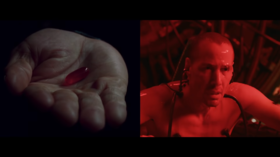‘Matrix’ writers set out to reclaim ‘Red Pill from right-wingers’


Two writers who worked on the latest ‘Matrix’ have revealed that they tried to weave their political messages into the movie, and wanted to ‘take back the term ‘Red Pill,’ which, they say, has been ‘kidnapped by right-wingers.’
In a recent interview for the A.V. Club to promote the new ‘Matrix: Resurrections,’ writers Aleksandar Hemon and David Mitchell reveal the political lenses through which they’d approached the film, and the narratives and ideas they’d tried to weave into the movie.
Interviewer Matt Schimkowitz pressed the writers about how current social and political issues such as “Cambridge Analytica, precursors to the ‘Metaverse,’ [and] social media radicalization” influenced the writing process for the movie.
“We were aware because you bring it into [the movie’s writing collective] The Pit, all that’s happening in the world, so we talked about specific things,” Hemon recalls. “Things like the Red Pill/Blue Pill trope or meme and how it was kidnapped by the right wing, the verb ‘to red-pill’ and so on. So one thing we were mindful of is how to reclaim that trope. To renew the meaning of Red Pill/Blue Pill.”
Schimkowitz then asked the writers if it felt ‘empowering to write a rebuttal to the weaponization of [Matrix creators] Lana and Lilly’s work,’ citing the ‘right-wing terminology’ used by Agent Smith throughout the movie, and his retorts, like ‘facts don’t care about your feelings.’
“I suppose the short answer is yes,” Mitchell said. “I don’t see myself as a frontline fighter in the culture war, but you also want your work to mean something, to have an ethical edge. One of the many reasons I’m proud of Resurrections is it does have that,” he continued. “What I’m trying to say is, I think the film has integrity, and perhaps that’s the source of the integrity.”
Hemon agreed with his colleague: “I concur. There is a bit of a difference between my and Mr. Mitchell’s situation in that, well, he’s a kinder person so he doesn’t get angry as much. But largely because I live in the United States,” adding that he is “infused with a need to confront some of the things that are taking place in this country. That was the case before and after.” Hemon then clarified: “But we did not set out to get into arguments with right-wingers.”
However, according to the two writers, some of their politically motivated ideas did not actually make it into the final version of the film. “I think, at some point, there was a joke about Red Pill and Blue Pill, and Lana [Wachowski, director] decided that she did not want to give any credence to that position, even a semblance of dialogue with that,” Hemon recalled. “There’s nothing to talk about with that.”
“It’s like having debates with creationists,” said Schimkowitz, wrapping up the interview. “By inviting them to the podium, it’s a tacit endorsement that the idea is up for debate.”
Hemon replies “My personal position is I don’t discuss things with Nazis and fascists. There’s nothing to talk about. One of us is just going to be left standing, and I want it to be me and my people.”